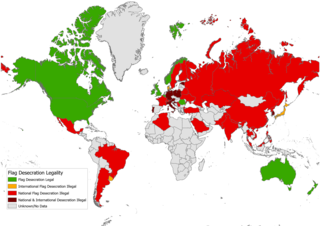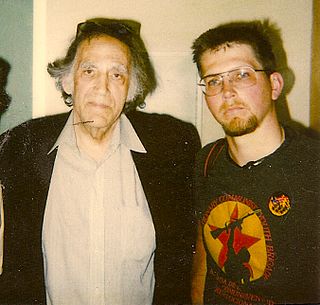
The First Amendment to the United States Constitution prevents the government from making laws which regulate an establishment of religion, or that would prohibit the free exercise of religion, or abridge the freedom of speech, the freedom of the press, the freedom of assembly, or the right to petition the government for redress of grievances. It was adopted on December 15, 1791, as one of the ten amendments that constitute the Bill of Rights.
West Virginia State Board of Education v. Barnette, 319 U.S. 624 (1943), is a landmark decision by the United States Supreme Court holding that the Free Speech Clause of the First Amendment protects students from being forced to salute the American flag or say the Pledge of Allegiance in public school. The Court's 6–3 decision, delivered by Justice Robert H. Jackson, is remembered for its forceful defense of free speech and constitutional rights generally as being placed "beyond the reach of majorities and officials".
Minersville School District v. Gobitis, 310 U.S. 586 (1940), was a decision by the Supreme Court of the United States involving the religious rights of public school students under the First Amendment to the United States Constitution. The Court ruled that public schools could compel students—in this case, Jehovah's Witnesses—to salute the American Flag and recite the Pledge of Allegiance despite the students' religious objections to these practices. This decision led to increased persecution of Witnesses in the United States. The Supreme Court overruled this decision three years later, in West Virginia State Board of Education v. Barnette (1943).
United States v. Eichman, 496 U.S. 310 (1990), is a United States Supreme Court case that invalidated a federal law against flag desecration as violating of free speech under the First Amendment. It was argued together with the case United States v. Haggerty. It built on the opinion handed down in the Court's decision the prior year in Texas v. Johnson (1989), which invalidated on First Amendment grounds a Texas state statute banning flag burning.
Cohen v. California, 403 U.S. 15 (1971), was a landmark decision of the US Supreme Court holding that the First Amendment prevented the conviction of Paul Robert Cohen for the crime of disturbing the peace by wearing a jacket displaying "Fuck the Draft" in the public corridors of a California courthouse.
Boynton v. Virginia, 364 U.S. 454 (1960), was a landmark decision of the US Supreme Court. The case overturned a judgment convicting an African American law student for trespassing by being in a restaurant in a bus terminal which was "whites only". It held that racial segregation in public transportation was illegal because such segregation violated the Interstate Commerce Act, which broadly forbade discrimination in interstate passenger transportation. It moreover held that bus transportation was sufficiently related to interstate commerce to allow the United States federal government to regulate it to forbid racial discrimination in the industry.

Flag desecration is the desecration of a flag, violation of flag protocol, or various acts that intentionally destroy, damage, or mutilate a flag in public. In the case of a national flag, such action is often intended to make a political point against a country or its policies. Some countries have laws forbidding methods of destruction or forbidding particular uses ; such laws may distinguish between desecration of the country's own national flag and flags of other countries.
Texas v. Johnson, 491 U.S. 397 (1989), was a landmark decision of the US Supreme Court that invalidated prohibitions on desecrating the American flag, which at the time were enforced in 48 of the 50 states. Justice William Brennan wrote for a five-justice majority in holding that defendant Gregory Lee Johnson's act of flag burning was protected speech under the First Amendment to the United States Constitution. Johnson was represented by attorneys David D. Cole and William Kunstler.
Chaplinsky v. New Hampshire, 315 U.S. 568 (1942), was a landmark decision of the US Supreme Court in which the Court articulated the fighting words doctrine, a limitation of the First Amendment's guarantee of freedom of speech.
United States v. O'Brien, 391 U.S. 367 (1968), was a landmark decision of the US Supreme Court ruling that a criminal prohibition against burning a draft card did not violate the First Amendment's guarantee of free speech. Though the Court recognized that O'Brien's conduct was expressive as a protest against the Vietnam War, it considered the law justified by a significant government interest unrelated to the suppression of speech and was tailored towards that end.
Eisenstadt v. Baird, 405 U.S. 438 (1972), was a landmark decision of the US Supreme Court that established the right of unmarried people to possess contraception on the same basis as married couples.
Stromberg v. California, 283 U.S. 359 (1931), was a landmark decision of the US Supreme Court ruling 7–2 that a 1919 California statute banning red flags was unconstitutional because it violated the First and Fourteenth Amendments to the United States Constitution. This decision is considered a landmark in the history of First Amendment constitutional law, as it was one of the first cases where the Court extended the Fourteenth Amendment to include a protection of the substance of the First Amendment, in this case symbolic speech or "expressive conduct", from state infringement.
The following is a timeline of the flag of the United States.
Street v. New York, 394 U.S. 576 (1969), was a United States Supreme Court case in which the Court held that a New York state law making it a crime "publicly [to] mutilate, deface, defile, or defy, trample upon, or cast contempt upon either by words or act [any flag of the United States]" was, in part, unconstitutional because it prohibited speech against the flag. The Court left for a later day the question of whether it is constitutional or unconstitutional to prohibit, without reference to the utterance of words, the burning of the flag.

For the ambassador, see Gregory Lee Johnson (ambassador)
Ludwig v. Massachusetts, 427 U.S. 618 (1976), was a case in which the Supreme Court of the United States held that the Massachusetts two-tier court system did not deprive Ludwig of his U.S. Const., Amend. XIV right to a jury trial and did not violate the double jeopardy clause of the U.S. Const., Amend. V.

The Smith Act trials of Communist Party leaders in New York City from 1949 to 1958 were the result of US federal government prosecutions in the postwar period and during the Cold War between the Soviet Union and the United States. Leaders of the Communist Party of the United States (CPUSA) were accused of violating the Smith Act, a statute that prohibited advocating violent overthrow of the government. The defendants argued that they advocated a peaceful transition to socialism, and that the First Amendment's guarantee of freedom of speech and of association protected their membership in a political party. Appeals from these trials reached the US Supreme Court, which ruled on issues in Dennis v. United States (1951) and Yates v. United States (1957).
United States v. Lee, 274 U.S. 559 (1927), is a significant decision by the United States Supreme Court protecting prohibition laws. The Court held 1) the Coast Guard may seize, board, and search vessels beyond the U.S. territorial waters and the high seas 12 miles outward from the coast if probable cause exists to believe that the vessel and persons in it are violating U.S. revenue laws, and 2) the Coast Guard's use of searchlights to view contents of a vessel on the high seas does not constitute a search and thus does not warrant Fourth Amendment protections.
Lafler v. Cooper, 566 U.S. 156 (2012), was a United States Supreme Court case in which the Court clarified the Sixth Amendment standard for reversing convictions due to ineffective assistance of counsel during plea bargaining. The Court ruled that when a lawyer's ineffective assistance leads to the rejection of a plea agreement, a defendant is entitled to relief if the outcome of the plea process would have been different with competent advice. In such cases, the Court ruled that the Sixth Amendment requires the trial judge to exercise discretion to determine an appropriate remedy.
Spence v. Washington, 418 U.S. 405 (1974), was a United States Supreme Court case dealing with non-verbal free speech and its protections under the First Amendment. The Court, in a per curiam decision, ruled that a Washington state law that banned the display of the American flag adorned with additional decorations was unconstitutional as it violated protected speech. The case established the Spence test that has been used by the judicial system to determine when non-verbal speech may be sufficiently expressive for First Amendment protections.




